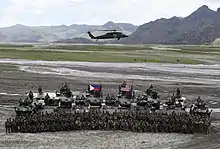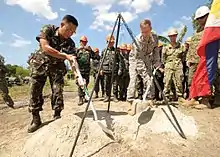Balikatan
Exercise Balikatan is the most prominent annual military exercise between the Philippines and the United States. The Tagalog word balikatan means "shoulder-to-shoulder".[1] The exercises have been the cornerstone of Philippines–United States military relations since the closure of U.S. bases in the Philippines.[2]
| Part of the Philippines–United States military relations | |
| Type | Multinational military exercise |
|---|---|
| Cause | Philippines–United States Visiting Forces Agreement |
| Participants | Armed Forces of the Philippines United States Armed Forces |



_11)%252C_and_Capt._Leopoldo_Alano%252C_Commander_Task_Force_80%252C_are_briefed_on_Philippine_and_U.S._Navy_events_during_Balikatan_2008.jpg.webp)
_before_they_depart_the_island.jpg.webp)
Australian armed forces have participated in Balikatan exercises annually since 2014.[3] Australia has a visiting forces agreement, a type of a status of forces agreement, with the Philippines called Philippines–Australia Status of Visiting Forces Agreement.[3] The Philippines is open to other allied countries participating, provided that they too have a similar forces agreement.[3]
Background
The U.S. acquired the Philippines after the Spanish–American War of 1898 and the subsequent Philippine–American War. The United States granted the Philippines independence in 1946.[4] In 1951, the governments of the United States and the Philippines signed the Mutual Defense Treaty to "strengthen the fabric of peace" in the Pacific by agreeing to defend each other's territory in the case of external attack.[5] In line with this treaty, the United States maintained until 1992 several military bases in the Philippines, including U.S. Naval Base Subic Bay and the Clark Air Base.
In 1998, following the bases' closure, the Visiting Forces Agreement (Philippines – United States) (VFA) was signed which contained guidelines for the conduct and protection of American troops visiting the Philippines, and stipulated the terms and conditions for the American military to enter Philippine territory. The VFA is a reciprocal agreement in that also outlines the requirements for Philippine troops visiting the United States.[6]
The Visiting Forces Agreement led to the establishment of the Balikatan exercises, as well as a variety of other cooperative measures.[7]
Operations
The Balikatan exercises are designed to maintain and develop the security relationship between the two countries' armed forces through crisis-action planning, through enhanced training to conduct counterterrorism operations, and through promoting interoperability of the forces.[8]
Over the years the exercises have expanded to include surrounding other countries in Southeast Asia. The training has had a shifting focus. During the U.S.-led "War on Terror" the annual Balikatan Exercises focused on training for counterterrorism missions.[8] There were student protests in the early 2010s over the continued presence of U.S. troops in the Philippines.[9]
These military exercises contribute directly to the Philippine armed forces' efforts to root out Abu Sayyaf and Jemaah Islamiyah and bring development to formerly insurgent-held areas, notably Basilan and Jolo. They include combined military training and civil-military operations and humanitarian projects. The International Military Education and Training (IMET) program is the largest in the Pacific and the third-largest in the world. A Mutual Logistics Support Agreement (MLSA) was signed in November 2002.
Balikatan 2022
The 2022 Balikatan exercise brought together over 5,100 US military personnel and 3,800 Filipino soldiers for training in maritime security, amphibious operations, live-fire training, urban operations, aviation operations, counterterrorism, humanitarian assistance, and disaster relief in various parts of Luzon from March 28 to April 8, 2022. The exercise included a command post exercise that tests the AFP and U.S. forces’ ability to plan, command, and communicate with each other in a simulated environment. This training bolsters the collective security and defensive capabilities of the alliance. Renovation of elementary schools, community health initiatives, and the exchange of advanced emergency rescue and lifesaving techniques were among the collaborative efforts.[10]
"Balikatan 22 coincides with the 75th anniversary of US-Philippine security cooperation and a shared commitment to promoting peace," Maj. Gen. Bargeron stated. “Our alliance remains a key source of strength and stability in the Indo-Pacific region.”
Exercises like Balikatan help to strengthen international alliances and the participating militaries' abilities to respond quickly to emergencies in the Indo-Pacific.
See also
- Philippines geostrategy
- Operation Enduring Freedom – Philippines
- Enhanced Defense Cooperation Agreement
- Operation Balikatan (2003)
- Regional geostrategy
References
- Talabong, Rambo (April 1, 2019). "PH, U.S. armed forces open Balikatan 2019". Rappler. Retrieved June 1, 2019.
- Tritten, Travis J. (April 15, 2011). "U.S. Philippines wrap up annual Balikatan exercise". Stars and Stripes. Retrieved May 15, 2014.
- Fonbuena, Carmela (May 17, 2014). "Australia joins Balikatan war games for the first time". Rappler. Retrieved July 17, 2014.
- "Philippines: A Country Study" Federal Research Division, U.S. Library of Congress
- The Avalon Project, "Mutual Defense Treaty Between the United States and the Republic of the Philippines; August 30, 1951", Avalon Project Yale Law School, Lillian Goldman Law Library
- "Visiting Forces Agreement" U.S. Department of State, 1998
- "Frequently Asked Questions: Visiting Forces Agreement" Presidential Commission on the Visiting Forces Agreement
- Camp General Emilio Aguinaldo, "PH-US Balikatan Exercises to Start in May" Armed Forces of the Philippine, April 21, 2014
- Sandy Araneta, "Student activists protesting Balikatan deface US embassy seal" The Philippine Star, April 17, 2012
- "37th Iteration of Balikatan Exercise Set to Begin in the Philippines". U.S. Embassy in the Philippines. March 22, 2022. Retrieved April 5, 2022.
